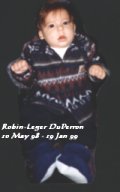![]()
Robin-Leger Clarence DuPerron
Life with Krabbes Disease, Leukodystrophy

![]()
Krabbes
is
a genetic disease, branched from Leukodystrophies, passed by both parents.
It is not gender specific. Any
child conceived has 25% being affected, 25%
being a non-carrier, and 50% chance of being a carrier.
A carrier in not affected.
The
disease is an error in the genes that does not allow nerve development in the
brain. In Krabbes, it is not
necessarily the amount of enzyme in the body which will determine the course the
disease will run, it is the mutation of the disease that will determine it. Most
children will have a common mutation, and there are 3 or 4 of them. However, there are undiscovered others. The area most affected by this is the Central Nervous System.
The CNS controls such things as breathing and body temperature; automatic in
body functioning. These affect so
many others, seizures can occur and digestion is inhibited. Without these basic
things, a domino effect is created. Poor
muscle control and rigidity, prevents
children from acquiring and retaining the basic milestones.
Robin-Leger
Clarence was born on May 10, 1998, Mothersí Day.
He was,
as we thought, a perfect 7 pounds- 8 Ĺ ounces and 19 inches in length.
He had long, thick, and beautiful dark brown hair and deep brown eyes.
As an added bonus, he also was born with a tooth. Oh, the joy of nursing.
For the first two months he seemed to be progressing, in my
opinion, a little bit behind, but otherwise normal. I say this because I have four children and I believe I know
what to expect at different stages. I
said to myself, ď Okay self, he is a
boy and boys are suppose to be a little bit slower than girls.
He will catch up.Ē Little
did I know that he was dying. Then
what came was that ever known ďcolicĒ
everyone talked about. Bob and I
would spend hours pacing the living room with Robin in our arms, trying to get
him to sleep. I thought I was
paranoid when I was taking him to the doctors every second week.
Telling them that there was something wrong. He wasnít eating very much, crying all the time, sleeping
for an hour or two, not having many dirty diapers, and I was holding him all the
time (every time I tried to lay him down,
he would start crying again.) It was hell and no one was listening to me.
And he was getting worse. For
example: At 4 Ĺ months Robin had
just started to roll over, holding his head by himself , and reaching for
objects in front of him, and smiling all the time. Within the span of days, he
lost them all. The hardest was the
smiles.
Feedings
become a challenge. The body is having trouble keeping food down and digesting
it at a normal rate. (Robin
would eat a meal and throw it up several hours later. The stomach just wasn't
moving it through.) Due
to this complication, "failure to
thrive" becomes a concern. (Robinís
first stay at the hospital was for this reason.
This is when the tests begun.) I t so happened to be my birthday when he
was admitted to the hospital for the first time.
Oh yes, this is the place I wanted to be.
During this stay they did some preliminary blood tests and assessments of
his mental and physical developmental stages, he was assessed at a one to two
month infant level. They also
performed a CAT Scan.
Some children may lose the ability to eat by mouth altogether
and nose-to-stomach / NG tubes or stomach / G tubes are used. (Robin
had a NG put in place two and a half months after the onset of symptoms. In his
short life, he had two bouts of Pneumonia, caused by aspirated food. He started
taking Cisapride to help the food move faster through his digestive track)
Children
with, classic infantile Krabbes, begin to present symptoms between 2 and 9
months. Early symptoms include irritability and rigidity.
Robin
had difficulty sitting in a car seat or layette chair.
His legs and arms were stiff like a soldier and wouldn't bend. The hands,
become locked like fists, the thumb tucked inside of the hand. (Robin-Leger
clenched his fists so tightly at one point, he was breaking fingernails off into
his hand.)
Most
children develop pneumonia several times in their lives.
![]()
Please
note, that in our case, Robinís immune system was extremely low. While he was
in the hospital for the second time, rushed by ambulance on the 27 October with
aspirated pneumonia. I had woken up
at 5 am to feed him, because he was on a very tight schedule set by the
dietician. When I went to check on
him I had noticed that he had thrown up and his breathing was labored. On closer examination he also looked a little gray.
He was in trouble and needed help, that I couldnít give him.
I was lucky that my girls were, for some unknown reason, up watching TV. I packed them up and headed for the nearest emergency room.
I had to contact my husband, Bob, who was out on a military exercise.
And my girlfriend to come and get the girls for me.
Bob showed up an hour later and my friend had come and taken the girls
home. The doctors had finally
gotten an IV line into Robin and he was rushed by ambulance to another hospital,
where they incubated him and gave him some anti-seizure medication, they said
were caused by the high fever, 40 plus degrees Ferenhiet. Once they felt that he was stabilized enough they took him to
yet another hospital, by ambulance. He
was incubated for a few days, until they felt that his pneumonia was being
controlled enough to see if he could breath on his own.
He did and then they moved him out of the ICU and into the pediatric step
down room, where he remained for the duration of this stay.
There the doctors did uncountable tests.
Some were: spinal tap, skin biopsy, eye exam, and some many blood tests
poor Robin looked like a pin cushion. They
felt that they could never take enough blood.
When we were told of the doctors suspicions, after dragging it out of
them. We were told that once he was
well enough to go home, to love him and make him as comfortable as possible,
until he dies. I cried for 30 hours
straight. I never left him and all
I could do was sit, in that rocking chair, looking at my son trying to sleep,
and the tears running down my cheeks. I
think I finally stopped because I actually ran out of them.
Then I said to myself, ďOkay you, smarten up, now that you have wasted all that time bawling,
letís focus on the next step. Letís
get Robin home where we can give him all the cuddles and kisses that we can
muster.Ē He was also
battling a severe diaper rash that looked like blisters,
was not going away easily. The
nurses were using a cream that was meant for cancer patients and pure oxygen to
get it to heal. My belief now, is
that the rash was caused by the fact that Robinís food was passing though his
body with high levels of stomach acid, which caused his behind to have what
looked like open sores or burns. He
received his first NG tube during this stay.
This one didnít stay long. He
was tested for reflux, but the tests were inconclusive.
However, they prescribed Cisapride for him, to help process his food
faster. We were still in denial and
I found by not giving it to him all the time he actually kept more food down.
That is to say, he would only throw up half of what he ate at a time
instead of all of it. But in
Robinís case, no sooner did it go in, it came right back out anyway.
This was a constant battle. I
did laundry everyday just to keep up with the towels we used for wiping up his
vomit. We found that receiving
blankets were just not big enough. We
were also waiting to have a MRI done, but the annestisist wouldnít put him
under until his pneumonia cleared up. And
ever time we had a date, for some reason or another it got cancelled. The doctors were more upset than we were.
My thinking now is what could or would it have changed?
Nothing.
The
other thing I must mention is, after we returned home from the hospital, we were
told that Robin also had the chickenpox. They
had to quarantine the ward at the hospital.
I actually had to laugh. Some
sort of small victory. Let them be
punished for putting Robin through so many tests.
I donít know what I was thinking.
But it made me happy to see the hospital in this dilemma.
The
third and last time he was in the hospital, it was for an infection in his hip,
requiring surgery to drain the fluid. Robin went to Kingston General Hospital on
Dec 3 with an exceptionally high fever for four or five days, and a possible
dislocated hip.
Robin
had surgery on his hip to drain the infection. He also had pneumonia again. Oh,
not to mention, he also had a cold. They
had him in ICU, incubated. He had a
ventilation tube down his throat to keep his airway clear. They were draining
the secretions off his lungs and they left the tube in overnight because his
previous admission was an aspirated pneumonia, they were afraid it might happen
again. They excubated (removed the ventilation tube from his mouth) in the
morning. He was on IV antibiotics to fight the infections. They said he might be
in the hospital for up to four weeks.
We
were still not sure, but hopeful to find out more information in the morning.
If he stayed in Hospital, he wouldnít be home for Christmas, but we
were going to do whatever it took, to bring him home soon.
I went on Sunday to relieve Bob so he could go back to work on Monday.
As
for the test results we were still waiting for, Bob was at the hospital, so in
the morning he was going to be asking questions. Our worst fears might have been
confirmed. He had been diagnosed
with Moderate Cerebral Palsy. That
meant in the long term that he might never walk, but he did vocalise, so we
thought there was a possibility that he might have been able to learn to speak.
It looked like we had a long challenging road ahead of us.
We hoped we were up to it.
We
left the hospital on the 18th of December. We had done it.
We were going to all be at home for Christmas. The catch was Robin came home with an IV line in his arm and
NG in place. We had said we would
be willing to do anything. A nurse
was set to come once a day for the next three weeks to administer and change the
antibiotics that he needed to treat his him infection.
Well Christmas Day came and went, but in the wee hours of the morning,
Boxing Day , 1230am we had to call the nurse to come.
Robinís IV line was leaking. This
couldnít be happening, the girls had gotten up a three in the morning
Christmas Day, so we hadnít had much sleep in the last 48 hours.
After she showed up and made some phone calls.
No Local hospitals wanted to deal with this IV problem so we were on our
way to Kingston General Hospital at an hour and a half away.
Now it is four in the morning and we wait in the emergency room.
Finally, our turn. After doing the normal stuff they have a look and decide that
they can salvage the line. Yes, now
we can go home. It is 7:30 am and
we make our way back home. Home at
9:30 am. Called the nurse to come
and start the antibiotics. She
arrives at 10:30 am. Guess what,
she canít flush the IV. She calls
the local hospital and explains the problem.
An hour later Dad takes Robin to the local hospital.
1:30pm, Dad calls to say that they have decided to take out the IV line
and give him an intramuscular injection. My
sister was arriving soon, no time for a nap.
I am just about to loose it. I
havenít slept in almost three days and my emotions are running just about out
of control. Dad and Robin get home just in time to meet my sister
and her husband for the first time. We
get some pictures and they are off. Robin
is finally asleep and I lean on Bobís shoulder and the next thing I remember
is I wake up lying on the couch, several hours later. This is not a day I care to repeat.
![]()
One
final symptom is unexplainable fevers. There is no apparent cause.
The body can not control body temperature.
Higher temperatures arise
during the early stages. In the
final stages of this disease, the temperatures drop
below normal. Robin would get so
cold to the touch that we had to wrap him in two or three blankets at a time and
put a winter hat on his head just to try and bring his temperature up.
This occurred in the last three weeks of his life.
Some
children decline rapidly, others stabilize.( For
Robin, from the onset of the initial symptoms, it took six months for this
disease to run its full course and consume him.
However, His official diagnosis was given on the 13th of January 1999,
and he passed away on the 19th of January 1999; at 8 months and 9 days old.)
In
the later stages, children may lose eyesight, hearing and experience paralysis. (Fortunately,
Robin was still able to see a little and hear before he passed away.)
Prolonged weight loss may also become a problem. In the last few weeks
before Robin died he had lost almost 4 pounds.
In the last three weeks before Robin died, he had become very lethargic
and quiet. He didnít seem to be
in pain nor did he have seizures. He
would still look at you and relay that he wanted to be held. In his last couple of days he didnít seem to be fighting
the disease anymore. He didnít
throw up anymore and his stools had become very loose, as if his body wasnít
even trying to digest his food. The
day before he died, he had a spell where he had stopped breathing for about 30
seconds, at 7am. When the nurse
came at 10 am his respirations were down to 10 breaths per minute. (I knew it
wouldnít be much longer.) I called Bob at work and told him right away, we
needed to make an appointment with the pediatrician to arrange for the DNR we
had been putting off. The day Robin
died, I took him to see daddy at work, which I didnít do very often, but I
wanted him to spend some extra time with Robin.
Then when Bob had finished work, I went to pick him up, which I also
didnít do very often. We made
some stops before we came home. One
was at the Funeral Home to pick up a card to start making those unmentionable
arrangements we knew had to be done. Robin
had been struggling all day with his breathing, I knew the time was coming.
After we arrived home, I was trying to get supper ready and Bob was
shoveling the driveway. I told him that I needed him to come inside to sit with Robin
so I could prepare the meal for the girls.
They had to eat. Bob took
Robin into his arms and was talking to him.
This was at 6:30 pm. Robin
was still fighting for breath and Bob took out the suctioning machine, we had
only gotten the week before and tried suctioning Robinís mouth and throat out
to no avail. And at 6:37pm Robin
had stopped breathing. He was gone,
passing away at home in daddyís arms and mommy right beside him. The way he had wanted. The
way we had fought to have it. No
more pain. No more suffering.
He has gone to the waiting open arms of his grandfather, Leger and his
great-great-grandmother, nana Burke.
Exploration
into cord blood and bone marrow transplants is at the experimental stage. Itís
purpose: eradicate the disease. It
may not make the child better. The brain has to remyelinate itself.
It may never happen. Even if it does, the functions that are lost may not
be regained. Once the area of the
brain has been damaged, it cannot be repaired.
Therefore, for those
presenting too many symptoms, it is not an option.
The disease eventually affects the entire brain. The nerves not being used, begin to die, areas of the brain
also die. This is a terminal
illness. Without proper brain functioning the body dies.
There
is no cure, but with the help of donations
we can assist in the research of this and other rare diseases, to help find a
cure. This is the same disease that
has affected Jim Kellyís, an ex-quarterback for the Buffalo Bills, son Hunter.
Their Foundation for research is Hunterís Hope.
There is also: Judsonís
Helping Hand, to assist in any way for families going for tests and
transplants. For more information
you can email me at: theppumpkinfamily@email.msn.com
Or send a letter to:
The Pumpkin Family
C/O Bob & Tammy DuPerron
199 Glasier Rd
Fredericton, NB
Canada
![]()

